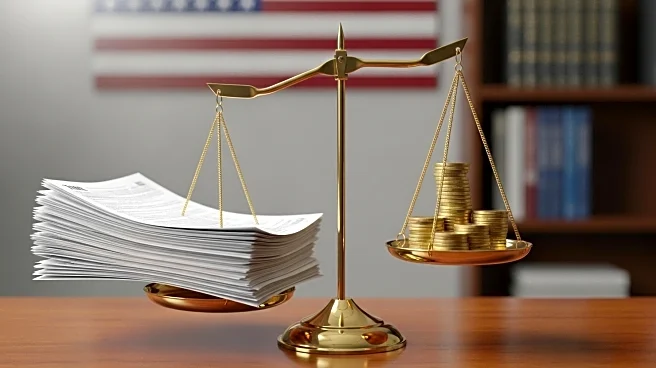What's Happening?
The One Big Beautiful Bill Act (OBBBA), signed into law by President Trump, represents a major overhaul of U.S. tax policy. The legislation, spanning over 1,100 pages, extends several provisions from the Tax Cuts and Jobs Act of 2017 and introduces new deductions, credits, and limitations. The Congressional Budget Office estimates that the OBBBA will increase the federal deficit by $3.4 trillion over the next decade, primarily due to projected revenue losses of $4.5 trillion from tax cuts. While some of this deficit is expected to be offset by spending reductions and tariff revenues, the sustainability of these measures remains a topic of debate. The Tax Foundation projects positive macroeconomic effects, including a 1.2% increase in GDP, the creation of approximately 938,000 jobs, and a 4% rise in wages over the long term. However, critics have raised concerns about the bill's equity, particularly regarding reduced federal support for programs like Medicaid and SNAP.
Why It's Important?
The OBBBA's enactment is significant as it reshapes the U.S. tax landscape, potentially affecting millions of taxpayers and businesses. The permanent extension of lower tax brackets and the introduction of new deductions could stimulate economic growth and increase disposable income for many Americans. However, the projected increase in the federal deficit raises concerns about long-term fiscal sustainability and the potential need for future policy adjustments. The reduction in federal support for social programs may disproportionately impact low-income individuals and families, sparking debates about the bill's fairness and social implications. For tax professionals, the OBBBA presents both opportunities and challenges, necessitating strategic adjustments in estate planning, capital investments, and compliance with enhanced reporting requirements.
What's Next?
As the OBBBA takes effect, stakeholders will closely monitor its impact on the economy and federal budget. Tax professionals will need to adapt their strategies to align with the new provisions, while policymakers may face pressure to address concerns about fiscal sustainability and social equity. The bill's clean energy rollbacks could also prompt reactions from environmental groups and advocates for renewable energy. Future legislative efforts may focus on refining or amending the OBBBA to balance economic growth with fiscal responsibility and social welfare.
Beyond the Headlines
The OBBBA's implications extend beyond immediate tax changes, potentially influencing broader economic and social dynamics. The reduction in clean energy incentives may affect the U.S.'s ability to meet climate goals, while the bill's impact on social programs could exacerbate existing inequalities. The legislation also highlights the ongoing debate over the role of government in economic management, with differing views on the balance between tax cuts and social spending. As the U.S. navigates these challenges, the OBBBA serves as a focal point for discussions on the future of tax policy and its role in shaping the nation's economic and social landscape.









